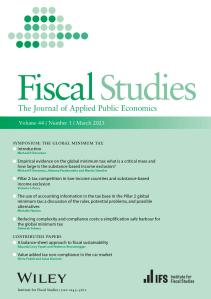Today's GDP figures show that the economy grew by 0.2% in the first quarter of 2010, half the increase recorded in the previous quarter when the UK began to pull out of recession.
In the election campaign much has been made of the impact of the timing of spending cuts and tax increases on the ability of the UK economy to sustain this recovery. This is an important issue, but much less attention has been given to the equally important question of how UK growth is likely to fare in the medium term.
In the short term, output will be bolstered as demand strengthens, firms increase employment, and the spare capacity in economy is gradually eliminated. Thereafter, the most important drivers of growth will be the efficiency with which we produce goods and services (our productivity) and the extent to which we develop new ideas (our innovative output).
Today, the IFS publishes a briefing note analysing of productivity, innovation and the corporate tax environment in the UK, including how policy and outcomes have changed since 1997 and what the parties are proposing (or not) going forward. An additional briefing note looks at UK productivity in the recession.
Historically, the UK has performed well on measures that capture the outputs of basic science and universities. However, the UK consistently lags behind the US and other major European countries in terms of the proportion of national resources which are devoted to Research and Development (R&D) and has had a persistent productivity gap with the US going back to the 1980s. During the last few years the UK and US experiences have continued to diverge - while labour productivity fell over the course of the recession in the UK, US productivity continued to grow throughout.
Productivity and innovation are not areas on which election battle lines are drawn. While all the main parties agree on their importance and have made positive statements about the role of government support for science, research and higher education, they have set out very few specific policies. In particular, none has given details of the level of funding or elaborated on the extent and composition of inevitable cuts to science related budgets. Although Labour have pledged a ring-fenced science budget, the Conservatives have proposed a multi-year science budget and the Liberal Democrats have pledged to ensure that the allocated science budget is not used for other purposes, none of these pledges rule out deep cuts.
Cutting spending in these areas would arouse little protest from the electorate; voters tend not to get riled if the government announces cuts to science budgets or reductions in subsidies for research. However, large cuts in such spending would have long term consequences; we could expect both a fall in innovative outputs and a reduction in the extent to which the UK is seen as a desirable place for firms to conduct research. This would risk placing the UK in a weakened position from which to recover. Whichever party forms the next government, they will need to consider cuts with caution.
Where there is more disagreement among the parties - and where they have set out some policy details - is on corporate taxes. The corporate tax environment is important, since the private sector accounts for around two thirds of innovative activity and plays a large role in the UK's productivity performance.
Labour and the Conservatives agree how much revenue we should try to raise from corporation tax, while differing on how that should be achieved. The main point of difference is the planned short term trajectory of statutory corporate tax rates and capital allowances. A new Labour government says it would leave the main rate unchanged at 28% in 2010-11 and increase the small companies' rate to 22% in 2011-12. But Labour has been aiming to increase the small companies' rate since 2009 - and deferring it each year since. Having made regular changes to the small companies' rate since 1997, we cannot say with any certainty whether their aspirations now are more likely to delivered on in the future than in the past. In addition, Labour have set out a desire to 'protect and increase the size of capital allowances' which would operate to narrow the tax base, a break from the base broadening under Labour since 1997.
In contrast, the Conservatives have announced plans to reduce the main corporate tax rate to 25% and the small companies' rate to 20%, in both cases to be funded by reducing capital allowances and therefore broadening the base of the tax. Many high profit firms would gain from such a shift. The losers would be those firms with capital intensive operations - with long lasting equipment and machinery - that currently benefit most from the capital allowances. While this is likely to apply more to firms in the manufacturing and transport sectors it may also be true to for some capital intensive service sectors firms.
The Liberal Democrats, while stating a desire to reduce business regulation and clamp down on corporation tax avoidance, have not mentioned corporate taxes in their manifesto. In the past, though, they have expressed a desire to reduce corporation tax rates by eliminating some reliefs.








